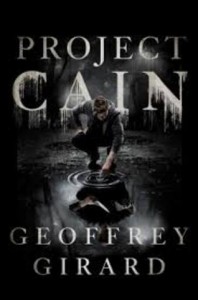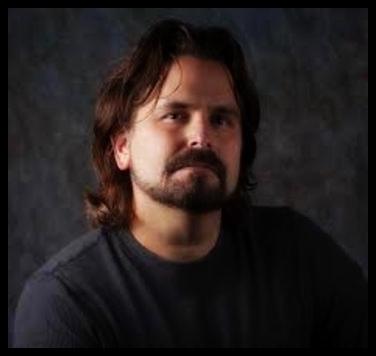Know a Nominee Part Twenty-One: Geoffrey Girard
Thank you for joining us for the latest installment of “Know a Nominee,” the interview series that gets you up close and personal with this year’s Bram Stoker Award nominees. Today’s featured nominee is Geoffrey Girard, nominated in the category of Superior Achievement in a Young Adult Novel for Project Cain (Simon & Schuster Books for Young Readers).
DM : Can you please describe the genesis for the idea that eventually became the work for which you’ve been nominated? In the case of a work wherein you’ve written multiple stories (like a collection) please choose your favorite part and discuss.
GG: I teach high school English and one day my students somehow got on the topic of serial killers. Next thing I knew, we were looking up various facts online and having a great discussion about Who, and How and Why. Since it was a topic I already knew a bit about, it was extra interesting to see both how fascinated they were and also to discover what they didn’t yet know on the subject. (Not that I knew much about serial killers at sixteen myself.) It made me want to write a sort of “Intro to Serial Killers” novel; something my own students could read. I went home that same day and dusted off an old novella I’d written about cloned serial killers, and started rewriting it as a full novel for young adult readers. As to the inspiration for that original story, I’d been trying to get something published in Apex Magazine which specializes in horror science fiction. Not just horror, and not just science fiction. It had to be both. I figured clones of famous serial killers matched that yardstick perfectly and could be much scarier than clones of dinosaurs. Apex ultimately ran the novella in four installments in 2007. The “Cain Universe” started there, with Jeff Jacobson as a more minor character.
DM: What was the most challenging part of bringing your idea to fruition? The most rewarding aspect of the process?
GG: “Project Cain” and “Cain’s Blood” are two different novels written about the same fictional event: cloned serial killers escape. The idea was to publish one book for adult readers and another for young-adult readers. Admittedly, the terms “adult” and “young adult” are mostly for marketing. “Cain’s Blood” is definitely much darker and very “R-rated” but those are the books I read as a teen. And Project Cain may be more “PG-13” and meant for readers new to serial killers, but I get letters all the time from adults saying how much they loved the book. It’s mostly a question of which style of writing you prefer and how dark you want your story. Cain’s Blood uses the form/devices of a traditional thriller. It follows the story from a dozen viewpoints; mostly from Castillo’s narrative point of view, but also chapters/scenes from the POV of various killers, military schemers, evil scientists, and victims. All capturing the big picture as the full story unfolds. Project Cain is told from the POV of only one character: Jeff Jacobson. It’s a much more personal story/journey told with the voice and reflections of a smart, lost and thoughtful teen. Cain’s Blood was finished and ready to be sold as a thriller to adults, but my agents and I were still trying to figure out how to do a version for younger readers (my original goal and submission to them). We thought a book entirely from Jeff’s point of view would work, but we all agreed I would only do that if Jeff’s voice was special and worth writing from. It was a great chance to try something really different with this second book, and that was exciting as a writer. Fortunately, Simon & Schuster was feeling equally creative. And while both books were shortlisted for a Stoker, it was the more-special telling that ultimately got an official nomination.
DM: What do you think good horror/dark fiction should achieve? How do you feel the work for which you’ve been nominated fits into that ideal?
GG: Dark fiction, for me, forces the extraordinary on ordinary folk to see what they’ll do. Capote said, “I can see every monster as they come in,” and I lean that way also. I’m a combination of always looking for and imagining the worst possible thing that could happen in any situation, mixed with a core belief in humanity somehow ultimately triumphing over that worst possible thing. I think dark fiction provides the opportunity for those kinds of stories/struggles to play out in a concise more-allegorical way. “Something Wicked Comes this Way” and” The Stand” come to mind immediately as very simple good versus evil tales and I think most dark fiction is just another variation on that basic theme. As to goals for achievement, good horror is, of course, never about the monsters. It’s about the people. It’s not capturing the car crash, but the reactions of the people in or later passing the crash. In “Project Cain”, teen Jeff Jacobson discovers he’s the clone of Jeffrey Dahmer. Not exactly the same thing as finding out you’re a promising wizard or the son of some Greek god. The horror element offered me the absurdist opportunity of telling this poor kid exactly what he’s made of and then seeing what he does about it. Every teen is trying to figure out who he/she really is, what they’ll soon become. Adding evil scientists and monsters just makes that discovery more immediate and accessible. And, fun.
DM: I’m curious about your writing and/or editing process. Is there a certain setting or set of circumstances that help to move things along? Where do you often find yourself getting stuck, and why?
GG: My writing process is to beat the crap out of a single sentence for ten minutes. And when it’s done, that’s the sentence you will see in print. I move on to the next sentence. It’s a horrible process, really, but I get the work done eventually. For years, I was quite quite envious of the people who can bust out 5k in a sitting, where 500 words is an accomplishment for me. But in the end, I know it takes us both take same amount of time to finish a project. I don’t do drafts. Once the book is done, it’s done. My “drafts” come sentence by sentence. Sometimes quite painfully. As a teacher, I encourage my students to just free write of course, to turn off that infamous inner editor, but it’s a half-hearted sale. I can’t do that at all. If I get stuck, it’s never on plot stuff, it’s on whether it should be “Fred walked into the room” or “Into the room walked Fred” or “Walking into the room, Fred…” or “The room Fred walked into…” I’m an English major straight through and love language and the ways to play with language and that can slow me down at times.
DM: As you probably know, many of our readers are writers themselves. What is the most valuable piece of advice you can share with someone who may be struggling to make their way in this life?
GG: The obvious is to collect/seek rejections like it’s your hobby. See them as accomplishments to be proud of. I have folders filled with hundreds of NOs. No one cares (or even knows) about those. A couple of YESs and you’re good to go. Just gotta keep sending stuff out and really listen when every author from King to Vonnegut talks about how often they were told NO up front. Specifically for new horror writers, I’m often surprised by how many read nothing but horror. This goes the same for authors in other genres, as well (the romance or literary or SF folk.) Too many read only in their genre. It’s a big mistake. You’ll never grow as a writer if you only read in one genre/tradition. Force yourself to read something totally outside your own writing at least every fifth book and your writer toolbox is gonna fill in surprising ways.
DM: What are you most looking forward to at this year’s Bram Stoker Awards/WHC (if you are attending)? If not attending, what do you think is the significance of recognitions like the Bram Stoker Awards?
GG: When I first attended the Stokers years ago, I remember being struck by the community of writers. It was my first writer awards of any kind and it was just nice being in a room completely filled with folk who’d been through the same struggles, who loved books and language and dark fiction. I just got the feel that the whole room would be happy no matter who “won.” I know that’s how I felt and still feel today. I’m the first to admit awards for Art are always problematic, as there were hundreds of great dark stories published last year. Picking the “Top Five” of anything is arbitrary and great reads always get left off. The Stoker awards, however, do present an opportunity to celebrate dark fiction, and the nominees are just passing deputies for that. With the nomination, I got my name in the local paper and a hand-written congrats from the president of Simon & Schuster. Meaning, folk outside HWA recognize the Stokers as something meaningful, a testament to the years of work HWA has done. And if someone sees my article and maybe looks into the awards and ends up buying NOS4A2 or In the Shadow of Blackbirds or ends up browsing the horror section of the local bookstore or Amazon, great! It was an honor to be included and, for this year, to represent our whole community. Next year, fifty others will take on that same role and then represent me.
About Geoffrey Girard
Geoffrey Girard first appeared in Writers of the Future in 2003 and has since penned more than 60 speculative stories for various magazines, anthologies and collections. His first book, Tales of the Jersey Devil, thirteen original tales based on American folklore, was published in Middle Atlantic Press in 2005 followed by Tales of the Atlantic Pirates (2006) and Tales of the Eastern Indians (2007). Simon and Schuster published two Girard novels simultaneously in 2013: Cain’s Blood, a dark techno thriller, and Project Cain, a spinoff novel for teen/YA readers. Born in Germany and shaped in New Jersey, Geoffrey currently lives in Ohio and is the English Department Chair at a famed private boys’ high school. He has a BA in English literature from Washington College and an MA in creative writing from Miami University. For more information, please visit www.GeoffreyGirard.com.





